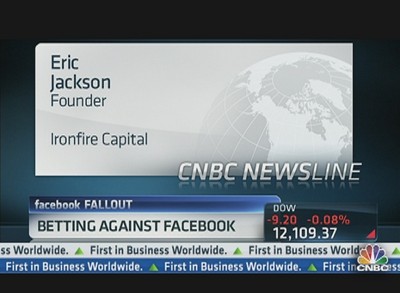Facebook will lose dominance as a major web company in less than a decade, Eric Jackson, founder of Ironfire Capital said Monday on CNBC's Squawk on the Street.
"In five to eight years they are
going to disappear in the way that Yahoo has disappeared," Jackson said. "Yahoo
is still making money, it's still profitable, still has 13,000 employees working
for it, but it's 10 percent of the value that it was at the height of 2000. For
all intents and purposes, it's disappeared."
Jackson said there have been three
generations of web companies. The first generation was big web portals, such
as Yahoo
[YHOO 15.01  0.09 (+0.6%)
0.09 (+0.6%)
 ]
, where content was aggregated in one place. The second was the social web with
Facebook
[FB 26.90
]
, where content was aggregated in one place. The second was the social web with
Facebook
[FB 26.90  -0.82 (-2.96%)
-0.82 (-2.96%)  ]
and the third generation is companies focused entirely on monetizing the mobile
platform, something Facebook will continue to struggle with, Jackson said.
]
and the third generation is companies focused entirely on monetizing the mobile
platform, something Facebook will continue to struggle with, Jackson said.
 0.09 (+0.6%)
0.09 (+0.6%)
 -0.82 (-2.96%)
-0.82 (-2.96%) 
"When you look over these three generations, no matter how successful you are in one generation, you don't seem to be able to translate that into success in the second generation, no matter how much money you have in the bank, no matter how many smart PhDs you have working for you," Jackson said. "Look at how Google [GOOG 578.59
 7.61 (+1.33%)
7.61 (+1.33%)
Last month Facebook acknowledged
its mobile challenge in a regulatory filing. The company stated that the growing
number of mobile users using Facebook
is hard to monetize and "may negatively affect our
revenue and financial results."
Jackson's comments on the future
of the social network come at a time when Facebook's stock is down about 27
percent from its IPO price of $38 a share, making it the biggest two-week loss
of any IPO since 1995.
"The world is moving faster, it's
getting more competitive, not less, and I think those who are dominant in their
prior generation are really going to have a hard time moving into this newer
generation," he said. "Facebook can buy a bunch of mobile companies, but they
are still a big, fat website and that's different from a mobile app."
CNBC
























0 comments:
Post a Comment
We Love To Hear What You think About The Post Or Blog.